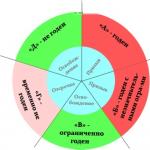Egg yolk contains a large number of substances that are necessary for the body. It has the shape of a semicircle with a protective film that can be pierced and then a thick yellow liquid will flow out of it (see photo). By the way, the color of the yolk directly depends on the color of the bird and on the feed.
Beneficial features
The benefits of egg yolk are due to the rich composition of substances that have a beneficial effect on the body as a whole. For example, it contains lecithin, which is necessary for nervous tissue and for the brain. In addition, it helps to improve the functioning of the liver and gallbladder. Due to the content of carotenoids, visual acuity improves, and the yolk is also a preventive measure before the development of senile cataracts.
There are in this product and phospholipids, which contribute to the excretion of cholesterol from the body. Given the content of choline, the risk of malignant tumors is reduced. Egg yolk contains up to 80% of phosphorus, which is present in the egg. It also contains omega-3 and 6 fatty acids, which are essential for the heart.
Egg yolk in cosmetology
Egg yolk is widely used for cosmetic purposes due to its nutritional properties. It helps prevent drying of the skin and hair, and the yolk helps reduce inflammation and irritation. As for the hair, it helps to make them softer and more manageable. When mixed with other ingredients, you can get rid of dandruff.
Use in cooking
Egg yolk has found use in cooking for the manufacture of various sauces, mayonnaise and creams. He is included in different pastries and salads.
Egg yolk benefits and treatment
Benefits of egg yolk used in recipes traditional medicine. For example, an ointment prepared on the basis of this product helps to cope with psoriasis. A mixture of yolk and pumpkin seeds helps to get rid of worms. In addition, there are recipes that help in the treatment of tuberculosis.
Egg yolk harm and contraindications
Egg yolk can harm people with individual intolerance to the product. It is also worth considering the high calorie content of the product, so you do not need to abuse it, as this will harm the figure and can lead to obesity. Contraindications to the use of yolk are in people with cholelithiasis.
Egg yolk is a common ingredient in a huge number of recipes. At the same time, few people were interested in what the egg yolk is useful for, so it’s worth filling in the gaps and sorting out this issue. In fact, this part of the egg is a mixture of biologically active and nutrients, which are intended for the development of the future bird.
What is useful yolk?
If we consider the composition of substances, it is worth noting that this product contains many minerals, vitamins and other useful substances.The benefits of egg yolk are due to:
- It is rich in phosphorus, necessary for the formation and restoration of bone tissue.
- The nutrients contained in the egg are fully absorbed in the body, which is extremely rare in other products.
- The presence of a large number of useful substances leads to the strengthening of the protective and regenerative functions of the body.
- Favorably affects the nervous system, as well as metabolism.
- The composition includes acids and omega-6, which are very useful for the body. They are important for hormonal balance, skin, nail and hair health.
It is worth considering  that the yolk of an egg can cause not only benefit, but also harm to the body. This is due to the presence of a large amount of cholesterol, but a person can only feel harm from this if he eats more than seven eggs a week. Not to mention the risk of infection, so it is important to choose and process the product correctly and not eat raw eggs. In addition, there are people with individual intolerance to this product, which manifests itself in the form of an allergy. It is also worth noting that the yolk is high-calorie, so there are 322 kcal per 100 g, so if you eat them in very large quantities, it can harm the figure.
that the yolk of an egg can cause not only benefit, but also harm to the body. This is due to the presence of a large amount of cholesterol, but a person can only feel harm from this if he eats more than seven eggs a week. Not to mention the risk of infection, so it is important to choose and process the product correctly and not eat raw eggs. In addition, there are people with individual intolerance to this product, which manifests itself in the form of an allergy. It is also worth noting that the yolk is high-calorie, so there are 322 kcal per 100 g, so if you eat them in very large quantities, it can harm the figure.
Such a seemingly ordinary product, like chicken eggs, turns out to be a great nutritional value– they must be added to our diet.
So, were discovered as a result of scientific research?
In a chicken egg is:
- A 8%,
- B12 30%,
- D 8%,
- E 10%.
Only they do not contain vitamin C. It is worth mentioning that eggs are saturated with amino acids and easily digestible protein, which is necessary for the proper development of a growing organism.
It should be noted that quail eggs contain vitamins in larger quantities than chicken - by 35% percent.
When choosing quail eggs, you protect yourself from the danger of contracting salmonellosis, since quails have a body temperature a couple of degrees higher than a chicken - this bacterium does not survive inside their bodies and does not get into the eggs.
The greatest amount of nutrients is found in the yolk of eggs of any laying bird. This is explained by the fact that the yolk was supposed to turn into a chick, and for its development, the bird's body collected in it all the vitamins, trace elements and amino acids necessary for the healthy development of its fetus.
Calcium, iron, phosphorus, potassium, copper, iodine and other trace elements - all this is part of the usual yolk.
Of the vitamins necessary for the human body, the percentage of their composition in the yolk of eggs should be noted.  Yolk chicken egg:
Yolk chicken egg:
- Vitamin A - 10%;
- D - 21%;
- B12 - 18%;
- B6 - 5%
Quail:
- Vitamin A - 10%;
- D - 13%;
- B12 - 26%;
- B6 - 10%
These figures are presented in a comparison of equal weight - three to four quail eggs equal one chicken. 
One of the most useful and necessary vitamins for our body, contained in the yolk of an egg, is vitamin D.
Vitamin D:
- Vitamin D helps the absorption of calcium in our body.
- Prevents the appearance of such a childhood disease as rickets. Again, because it maintains the normal content of calcium that enters the body with mother's milk or other products.
The benefits of this element are invaluable and are still being further researched and analyzed.

B12 vitamins in a boiled egg
It is difficult to overestimate the role of this vitamin:
- it is involved in the formation of red blood cells,
- necessary for the construction of nerve cells,
- helps in the absorption of proteins, fats and carbohydrates.
A lack of vitamin B12 leads to irreversible changes in the functioning of the nervous system, so it is extremely important to take care of eating foods containing this vitamin.
Given this feature of eggs, they will become not only pleasant and tasty, but also a useful element of the daily diet.
Being healthy, vigorous and active is possible thanks to the gift of nature - a natural, fresh product that our tamed pets give us - laying hens.
Vitamin A in eggs
100 grams of hard-boiled egg contains about 140 micrograms of vitamin A, with a daily requirement of 710-1010 micrograms for an adult.
Of course, eggs alone are not enough to fill the need for this vitamin, but you can safely use this product as one of the sources of retinol.
This vitamin is extremely important for health, as it performs the following tasks:
- participates in metabolic processes, forms hair, bones, teeth,
- necessary for the synthesis of visual pigment in the retina,
- strengthens the immune system
- is an antioxidant and helps in the prevention of cancer,
- lowers cholesterol levels
- slows down the aging process.
If you find yourself with dry skin and mucous membranes of the eyes, deterioration of nails, hair, it is likely that the body lacks this particular vitamin. To eliminate unpleasant symptoms, review the diet and enrich it with foods rich in retinol. 
Vitamin E
Eggs are one of the main sources of vitamin E along with olive and sunflower oil.
This powerful antioxidant makes the cells of the body more resistant to external influences, prolongs beauty and youth. Lack leads to muscular dystrophy, disruption of the liver and genital organs.
Vitamin E:
- involved in metabolism
- strengthens the walls of blood vessels,
- improves skin condition,
- accelerates wound healing.
100 g of egg contains about 2 mg of this vitamin with a daily requirement of 10-15 mg. Thus, by eating at least one medium egg a day, you will partially provide the body with this important vitamin.
Recently, more and more often you can hear that eggs are harmful, and that you don’t need to eat them at all, because there is a lot of cholesterol in the yolk. Moreover, it is not clear what kind of eggs we are talking about - after all, there are a great many of them, and each species has its own characteristics. And, by the way, eggs are not only birds, but also turtles. However, if we leave all these fabrications and turn to the most commonly used type of eggs - chicken eggs, then the following picture emerges.
Composition of egg yolk
In a chicken egg, the yolk of the total volume is 33%(on average, in liquid form). At the same time, it has 3 times more calories than protein - about 60 kcal. If we take a medium-sized egg as a sample, then its quantitative composition will be as follows: 210 mg of cholesterol, 2.7 g of proteins, 0.61 g of carbohydrates and 4.51 g of fat. By the way, the average chicken egg weighs about 50 grams. Fats in the yolk are mainly represented fatty acids- saturated, polyunsaturated and monounsaturated. Oleic acid is the leader in terms of percentage - it is 47% here.
Our ancestors treated this food with much more respect, and did not lay it out into components according to various criteria. In particular, the yolk was considered a symbol of the sun, and therefore medicinal properties. Often, people who were fed eggs recovered. Therefore, over time, people began to bring eggs of birds and domestic chickens as a gift to their pagan gods, so that in return they would give their laying hens more fertility. It is in our time that scientists calculate the amount of cholesterol and scare gullible fans of diets with it.
Contraindications for egg yolk
In many countries, scientists have studied eggs - protein and yolk separately. As for the yolk, it has been found that the yolk of an average chicken egg can contain from 215 to 275 milligrams of cholesterol. When various comparisons were made, it turned out that a bun with a fast food patty or a hamburger from a fast food restaurant contains a maximum of 150 milligrams of cholesterol. Therefore, for those who are at risk of heart disease, the yolk should be eaten with caution, because they can eat foods that contain no more than 200 milligrams of cholesterol per day. At risk are also all diseases that are caused and aggravated by high cholesterol in the blood. Eggs can be eaten without restrictions only for absolutely healthy people - scientists say. Separately, it is said about children and the elderly - they can eat no more than 2-3 eggs per week, and preferably not fried, but boiled.
Currently, similar studies are being conducted by American scientists - they argue that the egg yolk is accused of raising cholesterol unfairly. According to their research, lecithin, which is contained in sufficient quantities in the egg, prevents the increase in blood cholesterol levels. They even conducted experiments on two groups of people at risk for heart disease. One group was given no eggs at all for two weeks, while the second group was given 15 yolks a day. Two weeks later, everyone was retested, and out of 13 people who eat yolks, only two had cholesterol increased, two decreased, and the rest remained unchanged. Apparently, after all, the level of cholesterol is a purely individual matter, and there is no point in blaming all the troubles on the egg yolk.
In addition, there is a version that cholesterol itself is not something that is not harmful - it replaces the lack of calcium in the blood. Our smart body itself regulates the processes in which the lack of some substances is replaced by others. And when a person does not provide his body with calcium, the walls of blood vessels become fragile and can “break”. They can literally get holes in them because they get thinner. And then cholesterol comes to the aid of the vessels - it seems to “glue” those places where the vessels could burst. True, at the same time, the vessels narrow, but this is already a payment for the fact that not everything is in order in the body. And we are still afraid that cholesterol constricts blood vessels. You just need to understand that there is nothing accidental in the body - it is a very smart self-healing system that fights to the last, although we treat it simply ugly. And the reason for excess cholesterol is not that a person eats too much fatty foods or egg yolk, but that his diet is not balanced, and the body is simply forced to “defend itself” from its negligent owner.
It is possible that soon the traditional approach to egg yolk will change, and we will eat eggs more often than now recommended by nutritionists. However, for healthy people, such prohibitions do not exist at all.
Benefits of egg yolk
There are quite a lot of vitamins in the egg yolk, and the main one is vitamin B12.. This is a vitamin that brings energy and vitality - from it a person becomes vigorous and mobile. In addition, it is given to children when they lose their appetite. Vitamin A forms carotene in the yolk, as indicated by the yellow color. This is the vitamin of good vision in the first place. It also prevents the development of aging processes and prevents the formation of cancer cells. Not so much, but vitamins PP, B1, B2, E and D are still present in the yolk, which have a beneficial effect on the entire human body. As you can see, the egg yolk is very rich in vitamins, and this makes it very useful product especially for baby food.

Among other substances that are in the yolk, phosphorus can also be noted, which helps to keep teeth and gums in excellent condition, and it also takes an active part in all physiological reactions that occur in the body. There is also selenium, which is classified as an antioxidant. These are substances that protect us from harmful effects. environment- Tobacco smoke, exhaust gases, radiation, pesticides and other environmental troubles. The substance choline is essential for maintaining normal operation cardiovascular system, and it also nourishes nerve cells, therefore it is useful for the nervous system. More choline is found in the raw yolk.
The substance melatonin takes an active part in the rejuvenation of the body, as well as in the construction of new cells, so it is very useful for skin and hair. The substance lutein will help to avoid cataracts and improve vision, as it counteracts the occurrence of eye diseases.
Egg white is in high honor for many people: athletes, losing weight, trying to monitor the quantity and quality of nutrients entering the body. But the yolk has a worse reputation, to put it mildly. But is it fair to accuse him of the sins of which he is accused?
Research shows that eating eggs is a fairly convenient source of nutrients for the body. They can also play a key role in weight control, muscle strength, proper brain function, eye health, and are recommended for pregnant women. Just one egg a day reduces the risk of stroke by as much as 12%. By all accounts, the consumption of "chicken gift" is healthy and healthy, and each of us should include them in our diet, as well as ensure that the youngest eat at least two or three eggs a week.
eggs and cholesterol
Dozens of studies conducted by scientists around the world clearly state that this natural product is appropriate in the menu of almost every person. Where, then, did the thesis come from that eggs are bad and should not be eaten? Such a reputation is largely due to the fact that one egg contains about 200 mg of cholesterol, and most of this substance is stored in the yolk. Therefore, doctors urged us to be careful with the yolk, because high level blood cholesterol is the main cause of heart disease. However, few people take into account that the correct level of "good" cholesterol is necessary for the life and proper functioning of the whole organism. This substance helps to build new cells, supports the functioning of the nervous system, the production of hormones, and in the case of men, it helps to increase testosterone in the body. Under normal conditions, the liver produces cholesterol, which is found in animal products such as milk, eggs, and meat.
Of course, too high cholesterol contributes to cardiovascular disease. However, you should not consider animal foods (and egg yolks in particular) as the only culprit in cardiovascular disease. For some time now, scientists have been conducting research that already clearly shows that high cholesterol levels are not alone responsible for cardiovascular disease. Scientific studies have shown that saturated fats and trans fats actually have an effect on blood cholesterol levels, but this is also not the only factor that causes heart problems.
Nutrients in the egg
On the other hand, you need to pay close attention to the fact that the yolk of an egg contains almost all the necessary vitamins and minerals that are present in the egg. However, most of the nutrients will be lost if we ignore it and eat only protein. Yes, egg white contains approximately 60% of the total protein in an egg, but the yolk contains nutrients such as vitamin D, E, A, choline, and carotenoids that support the body in absorbing many of the important nutrients from eggs. In addition, eggs contain phospholipids, which can positively influence blood cholesterol levels and limit inflammation in the body. Therefore, it is not true that they lead to the formation of cholesterol and they cannot be eaten (or possible, but only in very, very limited quantities).
The nutrients in the yolk help lower blood pressure and improve the functionality of blood vessels. Preliminary findings from studies examining the effects of this natural product on Alzheimer's sufferers suggest that eggs may help reduce the symptoms of the problem.
Thus, from all of the above, it follows that eggs in general and yolks in particular are not to blame for diseases of the cardiovascular system, but rather the opposite. After all, they are full of nutrients that need to be actively used. We can freely eat eggs cooked different ways. Without a doubt, raw foods are the healthiest and contain the most nutrients. But many doctors warn about salmonella and other harmful microorganisms that may be present in them. However, nothing prevents you from preparing for breakfast, for example, a delicious and satisfying omelette that will provide energy for the whole morning.





